Rural People; Resilient Futures
Building Blocks of Community Resilience


Rural People; Resilient Futures
Building Blocks of Community Resilience


Purpose: investigate the nature of vulnerability in a rural shire, understand how this will vary under climate change and management options to support resilience


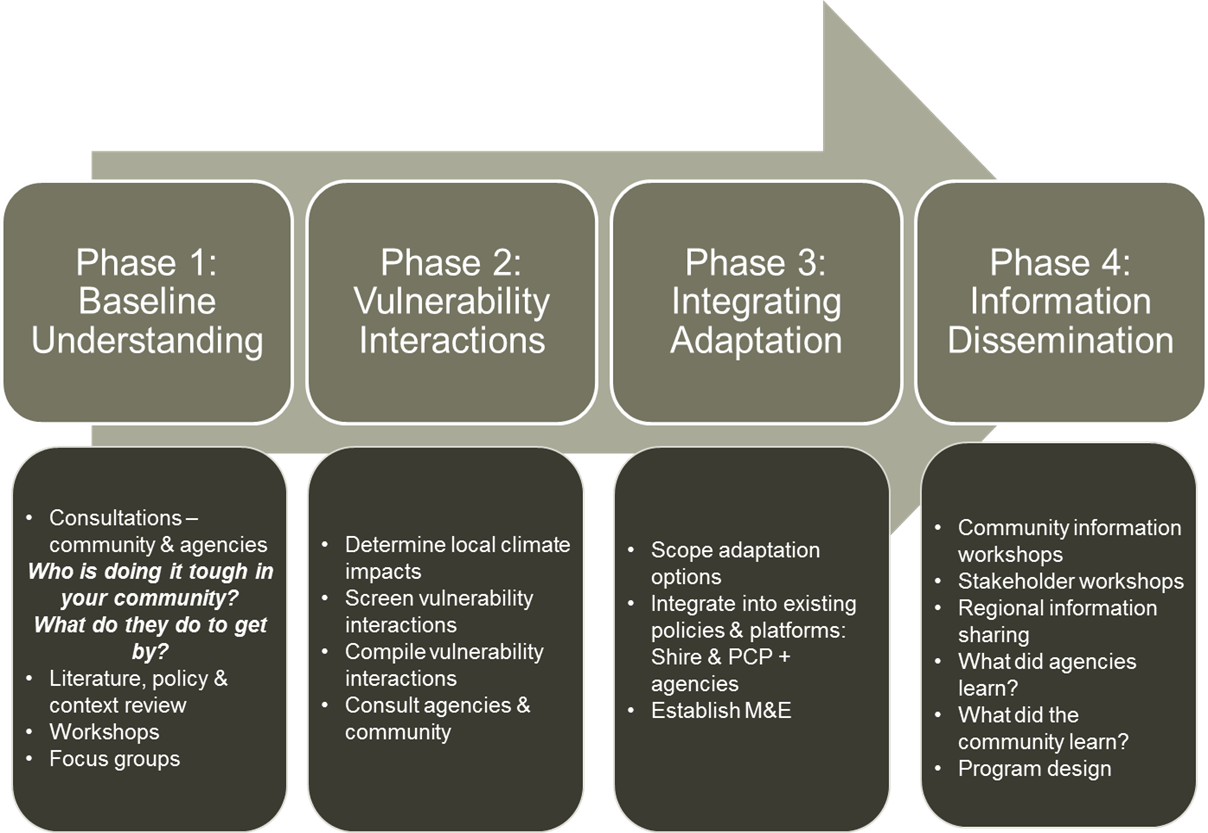
Phase 1
Phase 1
We found that there are a number of cohorts “doing it tough” in the Southern Grampians Shire:
- Low income families
- Farming Families living in isolated areas
- Socially isolated individuals
- Those with cognitive difficulties
Phase 1
We found that there are a number of cohorts “doing it tough” in the Southern Grampians Shire:
- Low income families
- Farming Families living in isolated areas
- Socially isolated individuals
- Those with cognitive difficulties
We found that
- Community Support and Social Engagement
- Access to services (particularly transport, community support and health)
.....Made life easier
Phase 1
The literature and policy review found that:
It is widely agreed that vulnerability is not a static attribute of a system but is characterised by a host of complex social and economic factors, often associated with entitlements and access of individuals or groups to resources relative to the context in which these individuals or groups sit (Adger and Kelly 2001: Cutter et al., 2003)
Vulnerability is largely context specific and difficult to define in a meaningful way
Phase 2
Phase 2
Working with health and community agencies to understand the impacts of climate change
Phase 2
Working with health and community agencies to understand the impacts of climate change
A workbook was developed to assist agencies identify the impacts of climate change on their service delivery and begin to develop strategies and actions.
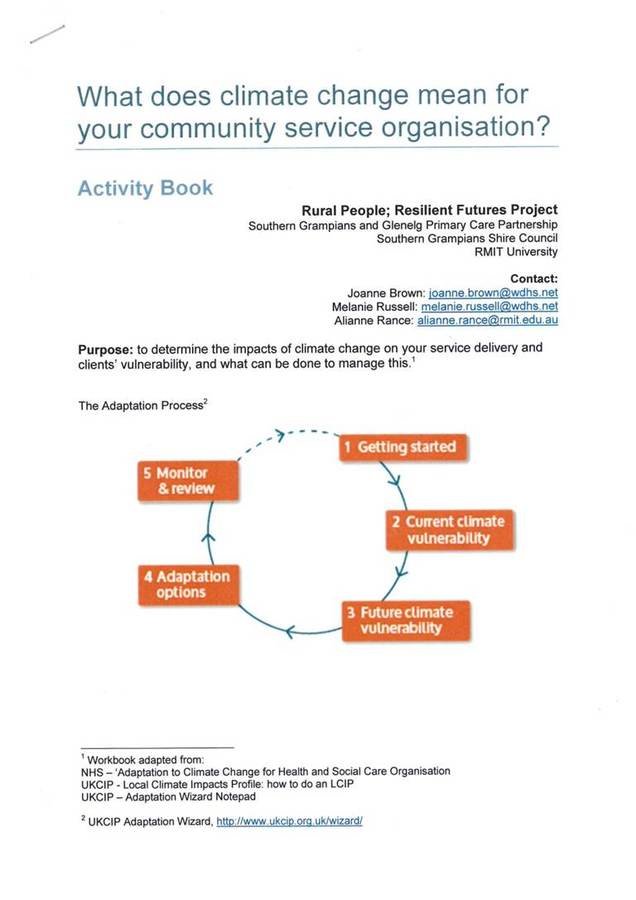
Phase 3
Integrating Adaptation
Phase 3
Integrating Adaptation
Agencies committed to integrate adaptation by:
- Review of and communication of policies and procedures
- Increase awareness and education for consumers and staff
- Share resources between agencies
- Create links between agencies
- Advocacy for leadership support
- Sharing and awareness with peak bodies and consumer groups
Phase 4
Communicating
Phase 4
Communicating
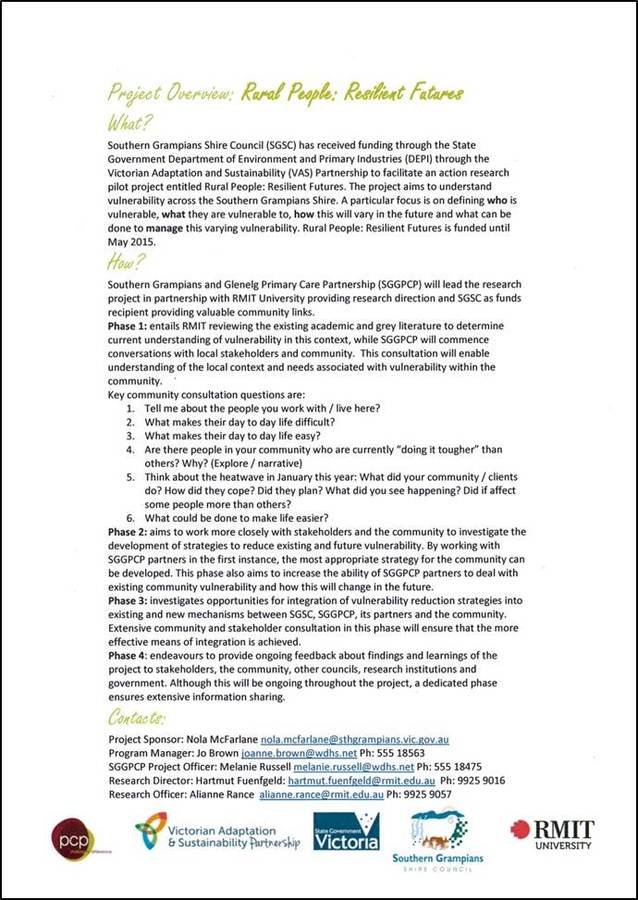
Phase 4
Communicating

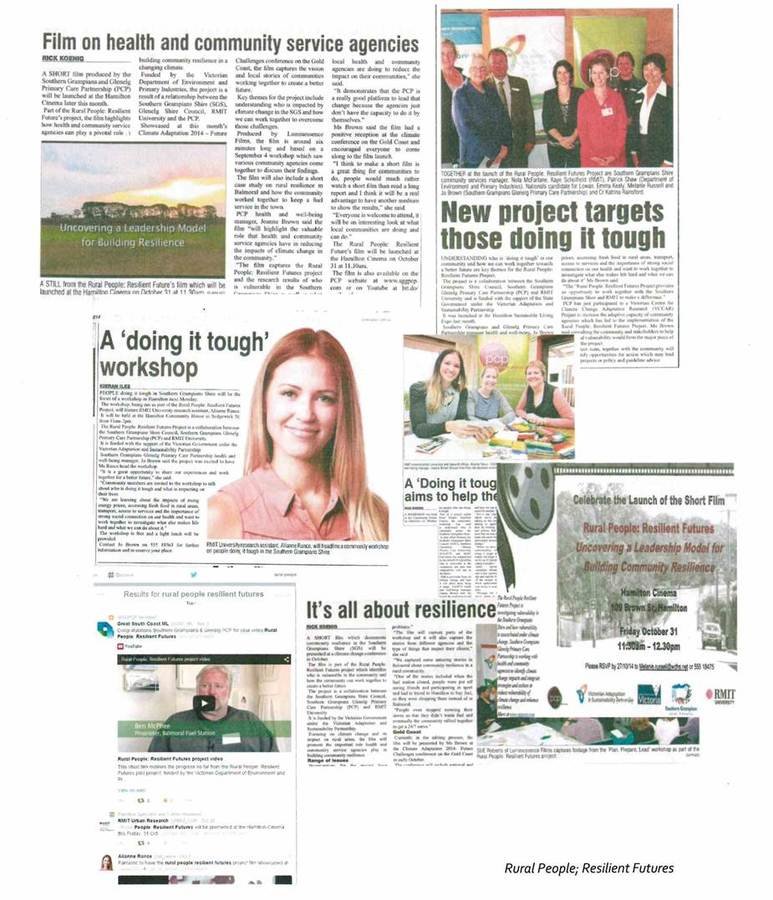
Phase 4
Communicating


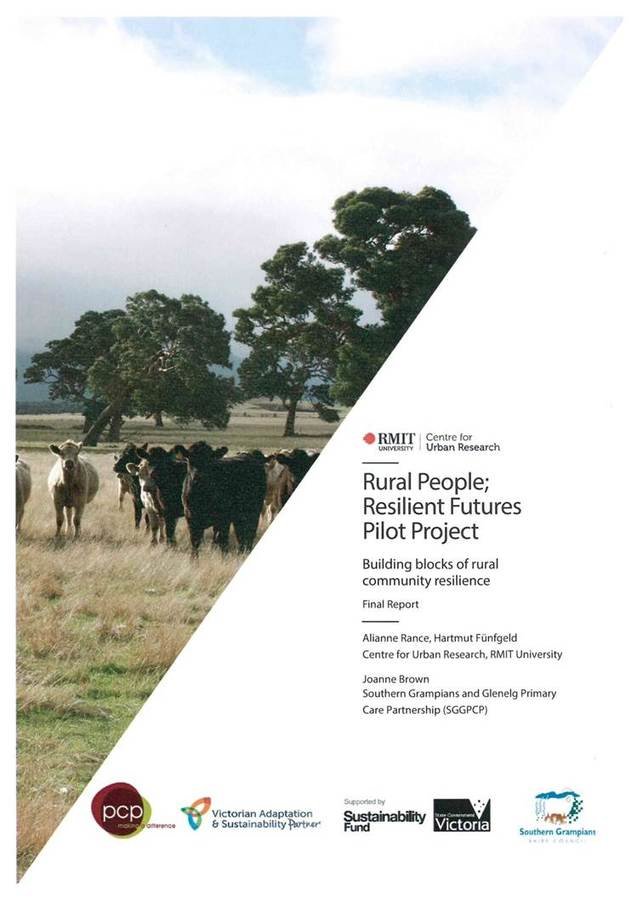
Phase 4
Communicating



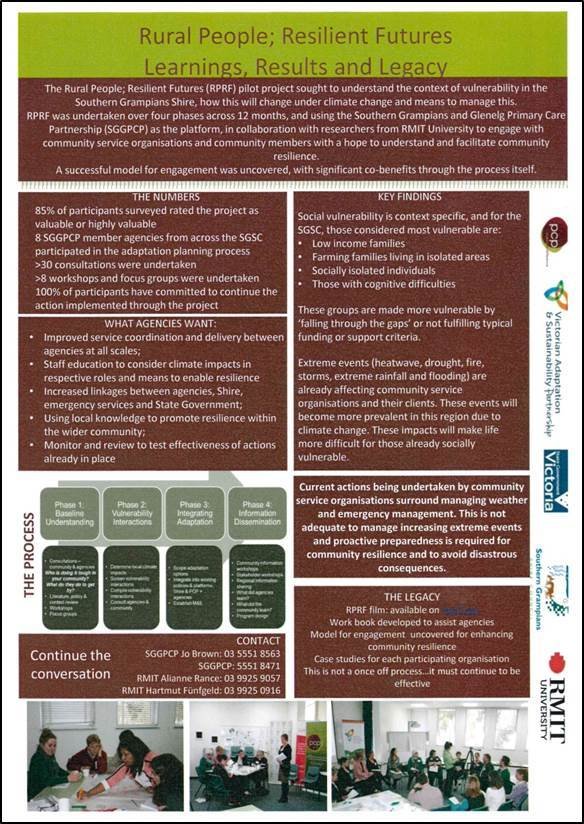
Phase 4
Communicating




Plus a project film:
Rural people resilient futures on YouTube!
The Results
The Results
85% of participants rated the project as valuable or highly valuable
8 member agencies participated in the adaptation planning process
> 30 consultations were undertaken across the community
The Results
>8 workshops and focus groups were undertaken
100% of participants have committed to continue the action implemented through the project
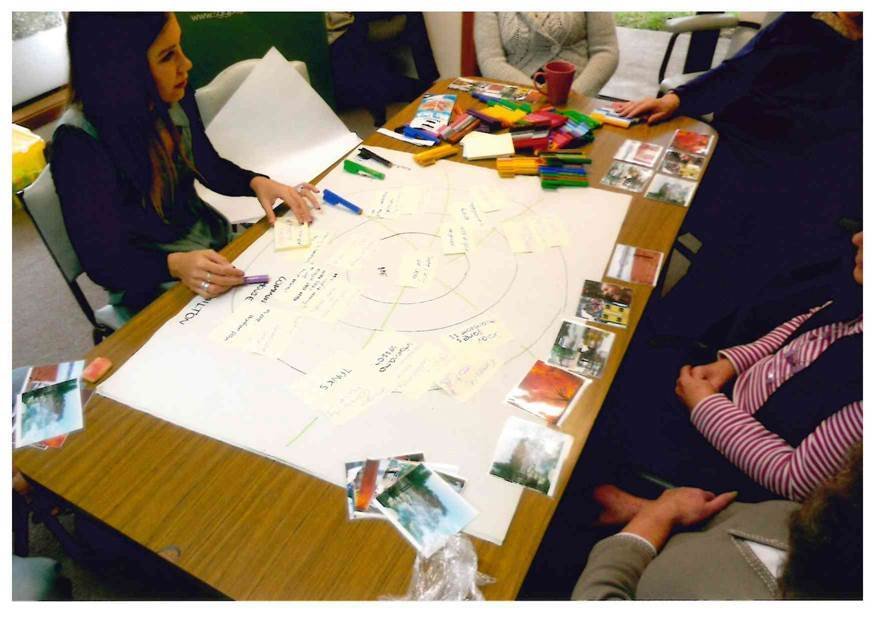
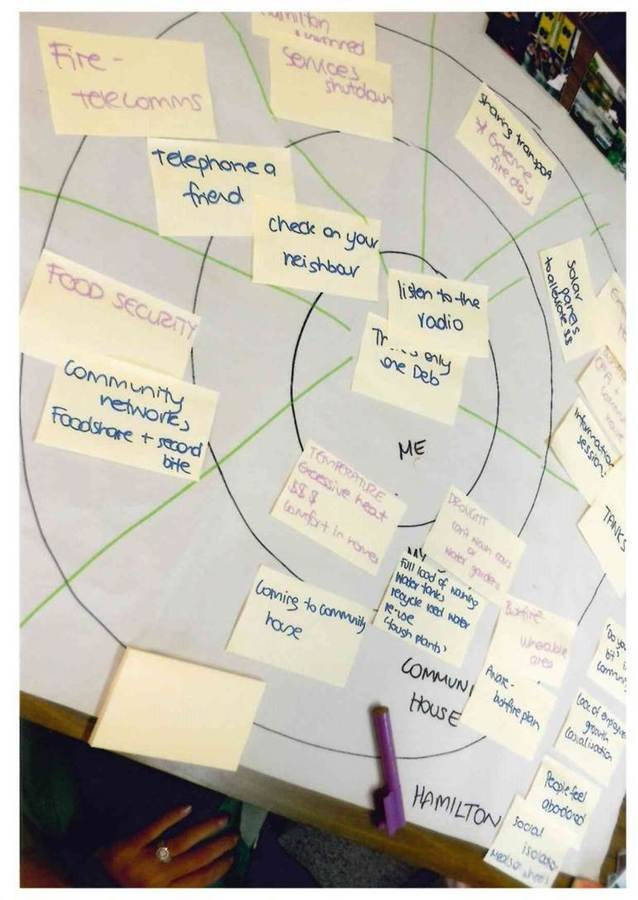

Participant evaluation: most valuable aspects of the project
Voices from the community
“I have looked more closely at our systems, policies and procedures, especially emergency preparedness and code red days etc.
I have built up a new network of local people to share information and ideas.
Our organisation has a better understanding of how important it is to think about adapting the attitude of climate change of those who access our service.
I have looked at how any important information is passed onto adults with disabilities in our service, so that any information is clear, easy read and relevant.”
“Climate change impacts affect a broad range of cross sections within the [organisation’s] Network and we are now committed to raise these issues at every opportunity to increase awareness and plant the seeds of thought for adaptation planning at higher levels”
“The project has changed my perspective. Not just work, but my personal situation. It makes me think about how climate impacts everyone I come into contact with”
“Climate change is a ‘background’ issue at the moment that impacts on every other health issue that we are working on. It’s important to have a handle on it. Learning about the methods that were employed throughout the project were useful too”
Continuing the journey
Continuing the journey
Capitalise on and learn more about the leadership platform of the PCP to provide the valuable link between agencies, the research sector and government
Agencies have strong networks with their community including vulnerable members – we need to understand how to enhance and further support these connections
Share the processes and outcomes of Rural People: Resilient Futures to build adaptive capacity
Rural People; Resilient Futures was carried out with financial support from the Victorian Government through the Victorian Adaptation and Sustainability Partnership Grant Scheme, through the Victorian Department of Environment and Primary Industries (DEPI). The funds holder of this project is the Southern Grampians Shire Council, with project partners as the Southern Grampians and Glenelg Primary Care Partnership and RMIT University. The working group would like to thank the support of DEPI representative, Pat Shaw for his enthusiastic encouragement and advocacy of the project. We would also like to acknowledge the engagement and dedication of the participating SGGPCP member agencies, including; Western District Health Service, Mulleraterong, Mental Illness Fellowship, Hamilton Neighbourhood House, Balmoral Bush Nursing Centre, WDHS Planned Activity Group and Allied Health and Southern Grampians Shire representatives. Rural People; Resilient Futures draws heavily on the experience of these organisations and the experience of the researchers in working with them.

